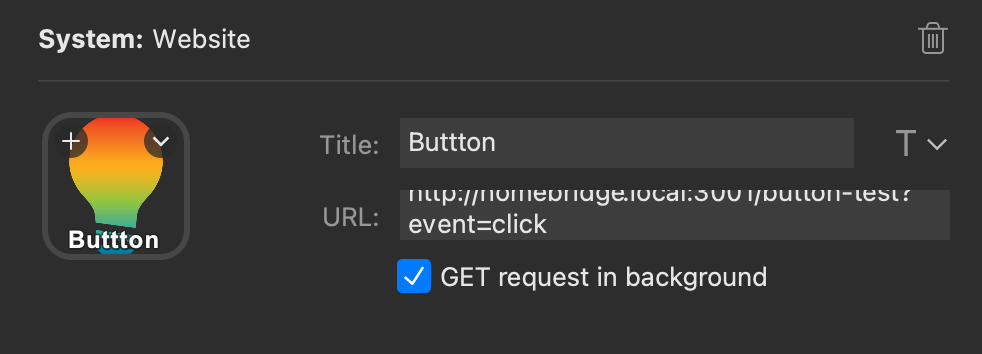ARCHIVED This plugin is no longer updated.
This Homebridge platform plugin creates virtual buttons that can be triggered using HTTP requests. It was originally created to provide HomeKit support for Flic smart buttons before the Flic Hub LR got native HomeKit support but can be leveraged by anything that can send HTTP requests.
Flic Hub LR now supports HomeKit: Flic released a firmware update for the Flic Hub LR on 2 December 2020 which included native HomeKit support. Visit https://flic.io/homekit for instructions on how to configure native HomeKit access.
This plugin requires a working home hub.
Before you install, ensure you have setup a HomePod, HomePod mini, Apple TV or iPad as a home hub for HomeKit. A home hub is required to run automations triggered by the button events generated by this plugin.
The simplest method to install and configure this plugin is via
homebridge-config-ui-x.
To install manually, run the following command in your Homebridge directory.
Depending on how you installed Homebridge, you may need to add the -g and/or
the --unsafe-perms parameters:
npm install [-g|--unsafe-perms] homebridge-button-platformThe -g option will install the plugin globally and the --unsafe-perms option
is needed for some platforms to install successfully.
The plugin can be configured via the homebridge-config-ui-x
admin interface.
To configure the plugin manually, add the following configuration to the
platforms block of your Homebridge config.json file:
"platforms": [
{
"platform": "button-platform",
"port": 3001,
"buttons": [
"My Button",
"Your Button",
"Their Button"
]
}
]You can add as many buttons to the array as you need. Each button will get its
own URI on which the server will listen for events. You can determine the URI
for each button by checking the Homebridge logs for
The Event URI for <button name> is: /button-button-name strings.
Note: renaming a button in
config.jsonis the same as deleting the old button and adding a new one, i.e. any configuration will be lost.
To trigger a button event, send an HTTP GET request with a specific query
string value or an HTTP POST request to your Homebridge hostname or IP address
and the port specified in the configuration of the platform, plus the URI for the
button.
The simplest method of triggering an event is to use a simple GET request with
the query string parameter of event set to one of the valid event types:
clickorsingle-pressdouble-clickordouble-pressholdorlong-press
For example, to send a single click event to a button using curl:
$ curl http://<homebridge>:<port>/uri?event=click
SuccessYou could also use this URL with a normal web browser.
Here’s a screenshot of what an Internet Request action should look like in the
Flic app if your Homebridge server is homebridge.local and the plugin
was listening on port 3001:
The values are as follows:
| Field | Value |
|---|---|
| Hub Action | Internet Request |
| URL | http://homebridge.local:3001/button-name?event=click |
| Type | GET |
The plugin from v1.5 onwards automatically creates a battery service when it detects it's being triggered by a Flic button and will update the battery level with the current value from the Flic whenever the button is pushed.
You can use the "Website" Stream Deck action to trigger an event. In the
Stream Deck configuration, drag the "Website" action to a key and configure
the URL to be http://homebridge.local:3001/button-name?event=click which uses the
same parameters as the GET request above:
Top tip: If you enable the
GET request in backgroundoption, a browser will not open when you hit the key.
If you use an HTTP POST request you must set the Content-Type header to either
application/json or application/x-www-form-urlencoded. The body of the request
needs a field named event with a value of one of the event types defined above.
For example, to send a double press event to a button using curl with a JSON
payload:
$ curl -X POST \
-H 'Content-Type: application/json' \
-d '{"event": "double-click"}' \
http://<homebridge>:<port>/<uri>You can also POST with an application/x-www-form-urlencoded payload:
$ curl -X POST \
-H 'Content-Type: application/x-www-form-urlencoded' \
-d 'event=double-click' \
http://<homebridge>:<port>/<uri>This is useful when used in with a larger form-based application.
Check the Homebridge logs for any warnings as the plugin will log any attempts to trigger an invalid event or any invalid URIs.

